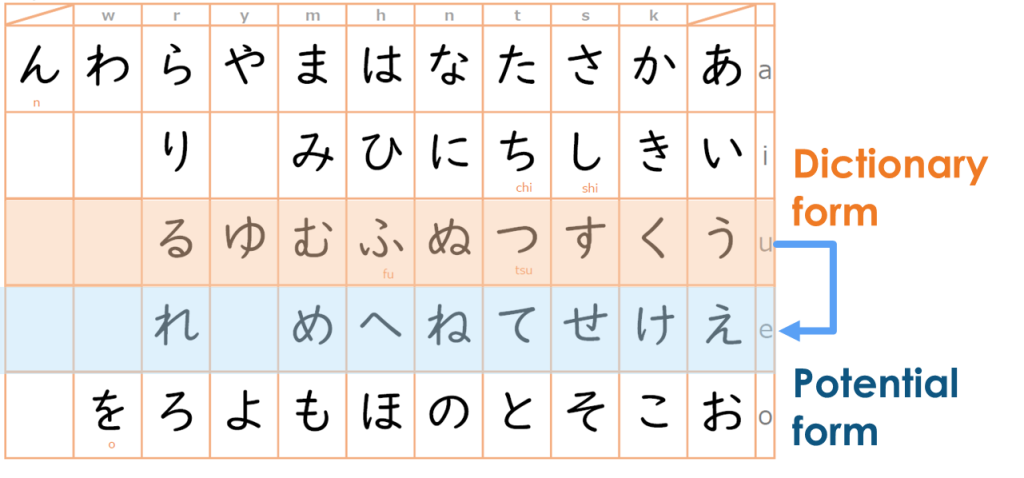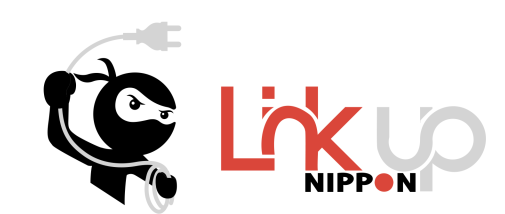Potential verbs is used when you are talking about your ability, or potential.We learned the “Dictionary form + ことができます” in our beginner’s class. Now you are on your way to intermediate! Let’s master this conjugation and speak with the potential verbs.
Today, we will learn how to make the potential verbs and some important expressions.
Table of contents
How to make Potential verbs?
First, Divide verbs into groups as usual. If you are faced with a new verb and are stumped as to how to divide the group, check here.
Next, I will explain how to convert Dictionary form to Potential verbs.
GroupⅡ/ Ru-verbs
たべ
る remove, add られる.る→ たべ られる
Group II is always easy! Say goodbye to ”Ru”and add ”Rareru”.
※In spoken Japanese today, some people do not pronounce this “ら” in a colloquial way like たべれる. In textbook Japanese, this is considered incorrect, but as with any language, languages change from day to day.
Group Ⅲ / Irregular verbs
する → できる
くる → こられる
”[noun] + が できる” is a very simple expression when talking about your abilities. For example, “日本語(にほんご) が できる” means “I can (speak) Japanese”
Group Ⅰ / U-verbs
The problem is Group I. But it’s ok. Everyone, please think of the hiragana chart.
For example,
あう → あえる
“う” changes to “え”. And add “る” or “ます” if it’s Masu form.
かく → かける
“く” changes to “け”.And add “る” or “ます” if it’s Masu form.

In Group I (U-verbs), there is always an “u-line” if it’s dictionary form. When making Potential verbs, it changes to “e-line”.
How to practice Potential verbs?
Step1. Proper understanding of rules
Surely, it seems obvious, doesn’t it? However, when different conjugations such as Negative form and Te form are introduced in the future, different rules will be used and many new verbs will be introduced. Therefore, it is important to firmly input “This is the rule for Dictionary form”.
Step2. Repeat until reflexive
In the beginning, You will think…”Which group is this verb?” ,and then if it is Group I, You will remind that “What is the letter before Masu…..?”.It is the right process. However, when it comes to real conversation, there is no time to think about it. You need to respond reflexively, i.e., within 1-2 seconds.
Definitely,if you want to be able to speak, this time lag can be a problem.So, for this kind of conjugate memorization, use flashcards.The recommended app is Anki. If you haven’t used it yet, please also read this article.
Potential verbs expressions for Pre-intermidiate learners
Potenetial verbs is often used when you want to talk about your potential, accomplishments, and goals, for example, in situations such as an interview for a job in Japan.
1. [Noun] が + Potential verbs ( I can ~ )
: Talk about possibilities and capability.
わたしは 英語(えいご) が はなせます。
I can speak English.
*はなす → はなせる (Group Ⅰ,U-verbs)
2. Potential verbs + ようになりました
: Talk about the achievements that have changed.
わたしは 日本のマンガ が よめる ようになりました。
I have learned to read Japanese manga.
*よむ → よめる ( Group I , U-verbs)
“ようになりました” is an expression that tells of a change of habit. Combine this with the potential verbs and you can talk about what you have become able to do.
3. Potential verbs + ようになりたいです
: Talk about about your goals.
おいしい日本料理を つくれる ようになりたいです。
I want to be able to cook delicious Japanese food.
*つくる → つくれる ( Group I , U-verbs)
More about Japanese grammar
At the Pre-intermediate level, you will learn many expressions with a narrower range of meaning than at the beginner level. This Grammar Expressions Dictionary is very useful at that time. You can use it like a dictionary for example sentences and detailed explanations of conjunctions.
A Dictionary of Basic Japanese Grammar 日本語基本文法辞典 Kindle Edition







